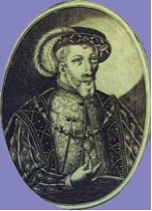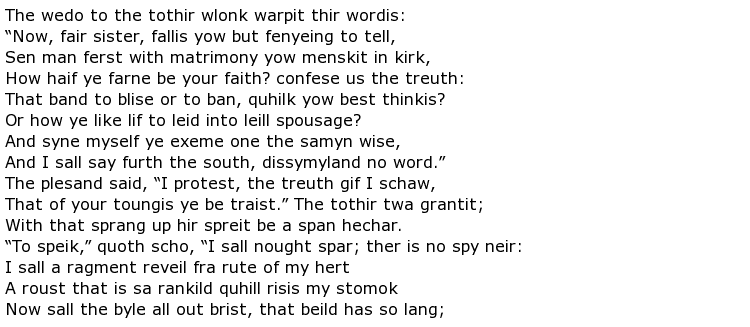 Not many medieval poets will have the distinction of being considered, even today, “modern”, but William Dunbar fits neatly into that category. Born in the 15th century, in Scotland, his words are, at first, a challenge but once you have got used to the dialect of that time, his messages are surprisingly contemporary in places. In many poems he adopts a curious, confrontational approach which is known as “flyting” and, indeed, one of his famous poems was called The Flyting. This is an exchange of sometimes scurrilous insults between one poet and another (in this case Dunbar and Walter Kennedy). He was favoured by the Scottish king James IV, being a Royal household member for some thirteen years, probably in some secretarial role.
Not many medieval poets will have the distinction of being considered, even today, “modern”, but William Dunbar fits neatly into that category. Born in the 15th century, in Scotland, his words are, at first, a challenge but once you have got used to the dialect of that time, his messages are surprisingly contemporary in places. In many poems he adopts a curious, confrontational approach which is known as “flyting” and, indeed, one of his famous poems was called The Flyting. This is an exchange of sometimes scurrilous insults between one poet and another (in this case Dunbar and Walter Kennedy). He was favoured by the Scottish king James IV, being a Royal household member for some thirteen years, probably in some secretarial role.
It is believed that William Dunbar was born in the year 1460, probably in the Scottish lowland region around Lothian. He certainly spent a great deal of his life in and around Edinburgh and won both bachelor’s and master’s degrees at the University of St Andrews between 1477 and 1479. He travelled a great deal, in Scandinavia, France and England and it is thought that he took great inspiration from these visits when writing his poetry.
His time at the royal court seems to have involved some legal work and he was known to be an occasional procurator, the Scottish term for advocate, within the courts of law. When the King died in 1513 Dunbar’s civil service career seems to have ended. In some ways it is surprising that he remained at court for so long as many of his poems appeared to be poking fun, in an overtly satirical way, at the activities within. His writings described the behaviour of many of the courtiers as self-seeking and envious, and mostly not to be trusted.
He wrote a number of his poems in short, lyrical fashion and he described them as “ballatis”. He could literally cover almost any subject that you could think of from the description of a simple malady to a fairly complicated treatise on penance, thus exploiting his legal knowledge and experience. He liked to produce longer pieces though, often using the traditional medieval “dream sequence” method of writing. Some, like the love story Goldyn targe, contained lyrical, flowing verses. Others could better be described as grotesque satires, bordering on nightmare visions.
Above all though, William Dunbar was a skilful poet and a master of alliterative verse, as demonstrated in The Tretis of the Twa Mariit Wemen and the Wedo. It’s his longest poem about the joys and trials to be endured in a marriage, with a widowed woman and two newly married ladies discussing the love of men without inhibition. A short section is reproduced here, giving a flavour of the piece:

Dunbar was something of a fatalist in some of his writing. Take for example the poem:

Here he gives a poignant view of death:

Many consider Burns to be the most famous of early Scottish poets but there is definitely a place for William Dunbar at that high table. Some even prefer the man who still, almost five hundred years later, has the ability to entertain and sometimes shock modern readers.
No details are known about William Dunbar’s death other than that he died in Scotland some time in 1522 at the age of 62.

